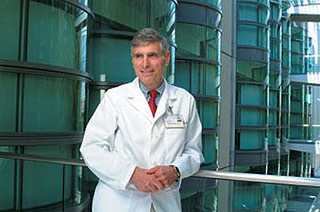 |
|
Dean Philip A. Pizzo, M.D. ; Photograph by Steve Gladfelter |
|
Dear Readers,
I’m concerned. I think you should be too.
In late February, Dr. Liz Blackburn, a professor of biochemistry and biophysics at UC-San Francisco, learned from the White House that her services on the President’s Council on Bioethics were no longer needed. This council’s task is to report on the ethics of therapeutic and reproductive cloning and Blackburn, an experienced cell and molecular biologist and a member of the Institute of Medicine and the National Academy of Sciences, had been one of only three full-time biomedical scientists among the 19 members.
Blackburn says she made it her responsibility to describe to the council the great potential for human health held by therapeutic cloning (more appropriately known as somatic-cell nuclear transfer). Blackburn’s favorable point of view toward SCNT is at odds, however, with the administration’s. In the end, Blackburn learned that the administration did not want her perspective considered. New England Journal of Medicine readers were informed in an April 1 opinion editorial penned by Blackburn that even though she provided the council information about animal models indicating the potential benefits of such research, this information failed to appear in the committee’s final Report on Monitoring Stem Cell Research.
Observes Blackburn: “…the best possible scientific information was not incorporated and communicated clearly in the council’s report, suggesting that the presentation was biased.”
Unfortunately, this is no isolated incident.
In the past three years I have watched ideology seep deep into scientific and
medical research. To be sure, the phenomenon is bipartisan.
More disturbing examples:
• Last year, the U.S. House of Representatives passed, with a clear margin, a law setting draconian limits on stem cell research.
• In January, Georgia’s superintendent of education proposed eliminating the word “evolution” from the state’s science curriculum.
• In February, the Union of Concerned Scientists, a group of 60 influential scientists including 20 Nobel laureates, issued a report detailing the negative impact of actions at the federal government level that have modified scientific research to accommodate political and ideological goals.
The group launched a campaign, “Restoring Scientific Integrity,” with an open letter calling for regulatory and legislative action “to restore scientific integrity to federal policymaking.” Stanford’s Paul Berg, the Robert W. and Vivian K. Cahill Professor of Cancer Research, Emeritus, was one of the individuals who signed this letter.
This is a call to action. As physicians, scientists and researchers we must play an active role in our democratic system. We cannot afford to sit back and wait for someone else to raise the issues. Too much is at stake. Moreover, ideology’s encroachment of science has dire implications for our representative government, reliant as it is on an informed citizenry. Furthermore, it spells trouble for medicine’s ability to pursue breakthroughs in disease prevention and treatment.
I would encourage each reader of this magazine — whether you are a physician, researcher, student or simply a concerned citizen — to educate yourself about the issues and, where appropriate, take an active role in responding when it is clear that political ideology is thwarting scientific research that serves the public’s interest.
This is a crucial time in our effort to improve the quality of life
of people who suffer from disease. Please join me in advocating for policies
that will give us the best opportunity to succeed in this most important
endeavor.
With best regards,
Philip A. Pizzo, MD
Professor of Pediatrics and of Microbiology and Immunology
Carl and Elizabeth Naumann Professor
Dean, Stanford University School of Medicine

